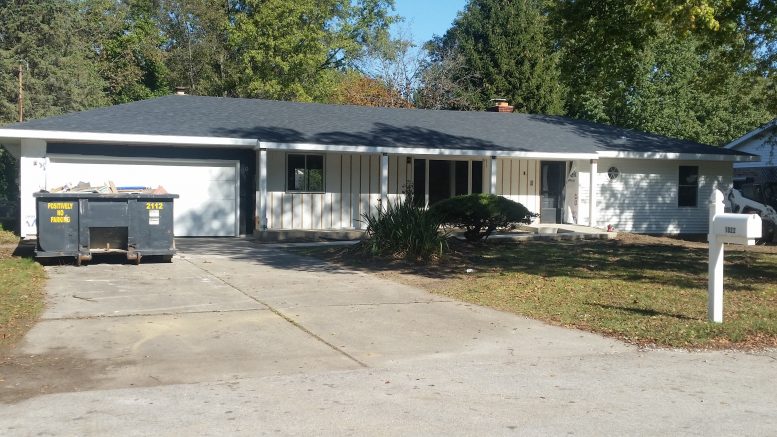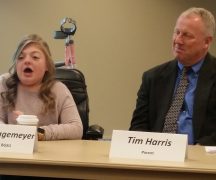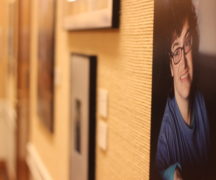By JAN LARSON McLAUGHLIN
BG Independent News
After decades of providing homes for adults with developmental disabilities, Wood Lane is working on its first home for children.
The home, at 1022 Melrose St., Bowling Green, will be home to four children whose families need assistance in caring for them.
“It’s new for us, but it’s something that everyone connected with our program knows we need,” said Brent Baer, superintendent of Wood County Board of Developmental Disabilities.
“In the last year, not a week has gone by that I haven’t heard that we can’t wait,” to offer homes for children, Baer said.
The board’s housing plan originally planned for a children’s home to be opened in 2019-2010. Then the house on Melrose became available.
“What a great place to grow up,” Baer said.
However, some neighbors on the quiet Melrose Street, that borders Wintergarden Park, are wondering how this new home will affect their neighborhood. Wood Lane had initially planned to use the Melrose home for the Horizons program, as a home for adults with unforeseen homelessness or behavioral difficulties.
But the Horizons program home will instead be located near Portage. “The owners live next door and they contacted us because they want us there,” Baer said.
That gave Wood Lane an opportunity to open its first children’s home on Melrose Street.
“There were cheers and claps from the staff,” when Baer told them a home for children could be opened sooner than expected. “These individuals and their families are in desperate need of this home. Their needs are just too much for one human being to keep up with.”
The staffing for the maximum of four children will likely be two workers during waking hours, and one at night. During the school year, the children will attend Wood Lane School or other local schools.
Wood Lane Residential Properties has 26 homes in Wood County for people with various levels of developmental disabilities. In addition to the Melrose Street home in Bowling Green, the residential properties program is also currently working on two more homes in Perrysburg, according to Jessica Miller Blakely, chief executive officer of WLRP.
Unlike Bowling Green, the city of Perrysburg requires such group homes to acquire a special use permit.
“Each community is unique in their zoning,” Blakely said.
In the case of the two Perrysburg homes, there was some neighborhood opposition, but the city approved the permits.
“I think a lot of it is an education piece,” Blakely said. “It really is no different from having a family live next to you with a couple of them having disabilities. We’re not changing it into a business. It’s a home. It will house people as a home.”
But not all the Melrose neighbors see it that way. Though the change to a children’s home is preferable to the adult proposal, neighbor Polly Miller is still uncomfortable with the plans. As a parent with four children, she is concerned about children with behavioral problems living in the new location.
“We just don’t feel it’s an appropriate place for a group home,” Miller said. She is not pleased that there has been no communication between Wood Lane and the neighbors.
“They just came in and started doing all this work, without contacting anyone,” she said. “We don’t like the way they’ve gone about it. It’s very frustrating.”
There are mixed feelings in the Melrose neighborhood, Miller said. But those with concerns deserve to have those questions addressed. “A lot of them have lived here for a very long time.”
One of those long-time residents is Ned Baker, who has lived on Melrose for 41 years, directly across the street from the new group home. He learned of the plans when he noticed a white square drawn in his yard where a waterline connection needed to be made for the home. Baker asked the city to put sod over the dug up area. The city declined, but Wood Lane put sod over the dirt, he said.
Baker is not worried about the plans to have children in the group home, but he would like some communication about the project.
“Nobody has made any effort to talk to us about what their plans are,” he said. That’s what good neighbors do, he added. “We do have some concerns that we would like to talk about. We are reasonable people. All we want to do is have some communication with them.”
But people who spend their lives working with others who have developmental disabilities see it differently. People who use Wood Lane services deserve to be part of the community, and not be segregated to certain areas, both Baer and Blakely said. No other neighbors would be expected to hold a meeting before moving in or making renovations to a home.
“It’s about the community integration,” Blakely said. “Everybody has a right to live in the community that they want to, despite their disability.”
Most of the Wood Lane consumers and their families desire homes in Bowling Green or Perrysburg so they are close to family and work.
“We’re going where people want to go,” Baer said.
Baer pointed out Bowling Green’s commitment to the Not In Our Town program promoting diversity and inclusiveness. Sometimes people need to be reminded that means more than acceptance of different races and religions, he said.
Blakely bristled at the thought that some Melrose residents want a special meeting.
“I’ll be glad to talk with them. I have no problem having a community meeting to educate the public,” she said. But then she added, “We shouldn’t have to do this. That’s discriminating.”
As for neighbors’ concerns about property values declining, Baer said that just isn’t the case.
“We are unaware of any research that demonstrates that homes for people with developmental disabilities decline in value,” Baer said. “We are good neighbors. We maintain our properties.”
Wood Lane Residential Properties purchased the home on Melrose Street for $200,000. The state kicked in $174,840 of that purchase price, Blakely said. The renovations are costing $150,000, with the state paying for $127,500 of that cost.
The need for such major renovations is because the home must be completely accessible. People using wheelchairs must be able to use the bathrooms, kitchen sinks and must be able to navigate the house easily. The house must have a sprinkler system installed.
“When we do renovations, they are extensive,” Baer said. “If anything, we’re the safest house in the neighborhood.”
Blakely also disputed the fears about falling property values.
“Property isn’t judged by the people in that house,” she said.
The renovations to the Melrose home should be complete by Dec. 1. An open house is planned once the work is done. The new residents will likely move in sometime in January or February. So far, there are three children, ages 12 to 14, in line for the four-bedroom home. There are six others contemplating the move in the next three to four years, with a maximum of four to live in the home at any given time, Baer said.





